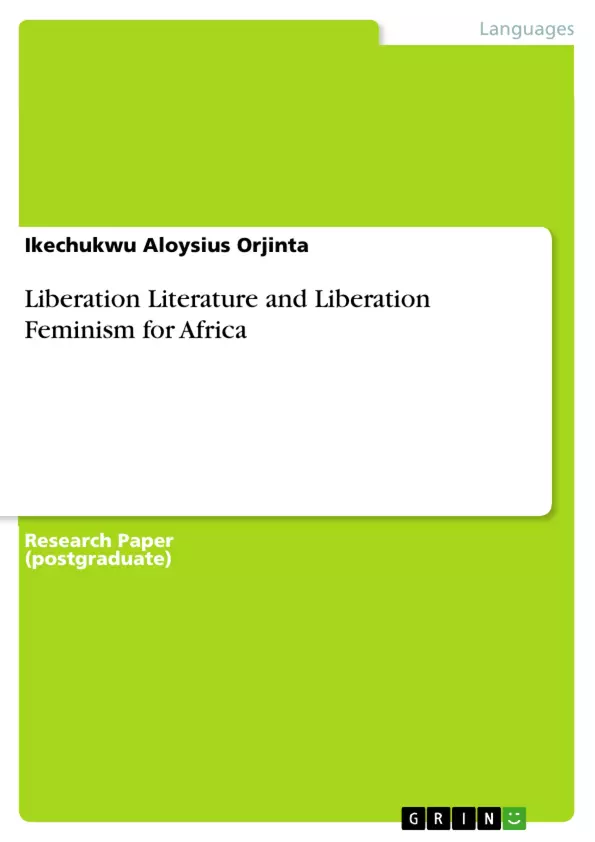Modern African francophone and Anglophone Literatures date back to the era of the negritude movement. The pioneer African writer was confronted by the ugly past experiences of the inhumanity of the Trans-Atlantic and Trans-Saharan Slave Trade coupled with the degradation of the colonial period. As a result, he decided to pitch his camp with his suffering people by prefering to portray this evil in his writings, creating awareness on ways forward and calling for reforms. His tool was the sociological method. He laid less emphasis on the German werkimmanenz, the French l’art pour l’art, the Russian Formalism and the North American close-reading. The African feminist writer also turned her back to the Euro-American version of feminism and preferred the home-made ideology termed Womanism and her sister acronyms such as Stiwanism and Motherism which maintain that men and women relationship and apportioning of roles in the society should be complementary and not rivalry-prone or confrontational, while condemning obnoxious cultural and anti-womanist practices. Hence African men and women should concert efforts in liberating the African continent which is still suffering from modern versions of Slavery and Colonialism.This research will apply a multi-disciplinary approach and invoke the womanist, psychoanalytical and existentialist theoretical frameworks inter alia to appraise the relevant works of Chinua Achebe, Aminata Sow Fall and Ahmadou Kourouma inter alia. Through their realist portrayals, these African writers have created awareness of the injustices perpetrated by African oppressors, both Euro-Americans and their African collaborators. This research is a call on African writers for more prophetic and liberating efforts in their creatic works and aesthetics. Liberation Literature should by so doing ursher in a GREAT REFUSAL of the status quo and a way forward towards the birth of the beautiful ones in Africa who will fashion out a home-made literary, political, economic and social transformation for the betterment of not only women, but also men as well as youths of Africa.
Inhaltsverzeichnis (Table of Contents)
- Abstract
- General Introduction
- Literature and Sources
- Methods
Zielsetzung und Themenschwerpunkte (Objectives and Key Themes)
This research aims to explore the concept of "Liberation Literature" in the context of modern African francophone and Anglophone literatures. The work argues for an authentic African literary tradition, free from the influence of Euro-American canons and standardization, and advocates for a shift towards a more self-aware and socially conscious African literary production.
- The need for African writers to create a unique and authentic literary tradition, free from external influences.
- The importance of social and political engagement in African literature, emphasizing the role of the writer as a social critic.
- The exploration of liberation feminism and its implications for African society, particularly in the context of gender roles and family structures.
- The importance of integrating African philosophies and perspectives into the theoretical frameworks used in literary analysis.
- The call for a more self-aware and critical approach to the production and reception of African literature.
Zusammenfassung der Kapitel (Chapter Summaries)
The abstract provides a concise overview of the research's main arguments and objectives. The general introduction delves deeper into the history of African literature, outlining the evolution from Negritude to the emergence of a more socially conscious and independent literary tradition. It criticizes the prevailing Euro-American influences on African literature and scholarship, advocating for a shift towards an authentic African aesthetic. The "Literature and Sources" section lists key works that inform the research, highlighting the influence of liberation movements, feminist theory, and African philosophy. The "Methods" section outlines the multi-disciplinary approach employed by the research, focusing on the application of womanist, psychoanalytical, and existentialist theoretical frameworks to analyze the works of Chinua Achebe, Aminata Sow Fall, and Ahmadou Kourouma.
Schlüsselwörter (Keywords)
The key terms and concepts explored in this research include Liberation Literature, African Literature, Womanism, Liberation Feminism, African Philosophy, Postcolonial Literature, Social Criticism, Euro-American Influence, African Authenticity, and Literary Dependence.
Frequently Asked Questions
What is "Liberation Literature" in the African context?
It is a literary tradition that seeks to liberate the African continent from modern versions of slavery and colonialism by portraying social injustices and calling for reforms.
What is the difference between Euro-American feminism and "Womanism"?
Womanism (and related terms like Stiwanism) emphasizes that gender roles should be complementary rather than rivalry-prone, focusing on the specific cultural needs of African society.
Which African writers are analyzed in this research?
The research appraises relevant works of Chinua Achebe, Aminata Sow Fall, and Ahmadou Kourouma using multi-disciplinary frameworks.
Why does the research criticize "l’art pour l’art" for Africa?
The author argues that African literature should prioritize social criticism and the sociological method over purely aesthetic or formalist approaches like "art for art's sake."
What is the "GREAT REFUSAL" mentioned in the abstract?
It is a call for African writers to reject the current status quo and work towards a home-made literary, political, and economic transformation for the continent.
- Arbeit zitieren
- Dr. Dr. Ikechukwu Aloysius Orjinta (Autor:in), 2013, Liberation Literature and Liberation Feminism for Africa, München, GRIN Verlag, https://www.grin.com/document/266439



